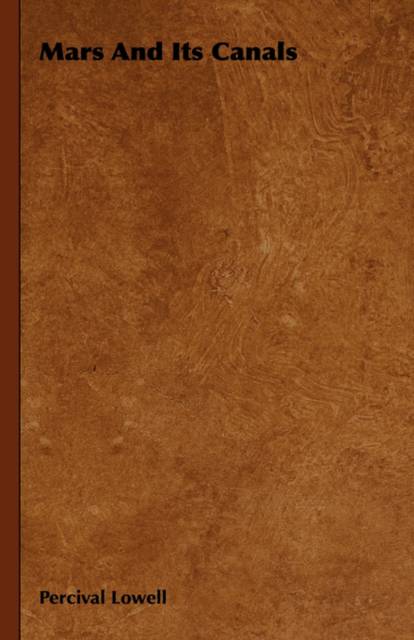
- Retrait gratuit dans votre magasin Club
- 7.000.000 titres dans notre catalogue
- Payer en toute sécurité
- Toujours un magasin près de chez vous
- Retrait gratuit dans votre magasin Club
- 7.000.0000 titres dans notre catalogue
- Payer en toute sécurité
- Toujours un magasin près de chez vous
Description
MARS AND ITS CANALS by PERCIVAL LOWELL . Originally published in 1911. PREFACE: ELEVEN years have elapsed since the writers first work on Mars was published in which were recorded the facts gleaned in his research up to that time and in which was set forth his theory of their explana tion. Continued work in the interval has confirmed the conclusions there stated sometimes in quite unexpected ways. Five times during that period Mars has approached the earth within suitable scan ning distance and been subjected to careful and prolonged scrutiny. Familiarity with the subject, improved telescopic means, and long-continued train ing have all combined to increased efficiency in the procuring of data and to results which have been proportionate. A mass of new material has thus been collected, some of it along old lines, some of it in lines that are themselves new, and both have led to the same outcome. In addition to thus push ing inquiry into advanced portions of the subject, study has been spent in investigation of the reality of the phenomena upon which so much is based, and in testing every theory which has been suggested to account for them. From diplopia to optical inter ference, each of these has been examined and found incompatible with the observations. The phenomena are all they have been stated to be, and more. Each step forward in observation has confirmed the genu ineness of those that went before. To set forth science in a popular, that is, in a generally understandable, form is as obligatory as to present it in a more technical manner. If men are to benefit by it, it must be expressed to their com prehension. To do this should be feasible for him who is master of his subject and is both the best test of, and the best training to, that post. Espe cially vital is it that the exposition should be done at first hand for to describe what a man has him self discovered comes as near as possible to making a reader the co-discoverer of it. Not only are thus escaped the mistaken glosses of second-hand knowl edge, but an arorna of actuality, which cannot be filtered through another mind without sensible evap oration, clings to the account of the pioneer. Nor is it so hard to make any well-grasped matter com prehensible to a man of good general intelligence as is commonly supposed. The whole object of science is to synthesize, and so simplify and did w r e but know the uttermost of a subject we could make it singularly clear. Meanwhile technical phraseology, useful as shorthand to the cult, becomes meaningless jargon to the uninitiate and is paraded most by the least profound. But worse still for their employ symbols tend to fictitious understanding. Formulae are the anaesthetics of thought, not its stimulants and to make any one think is far better worth while than cramming him with ill-considered, and therefore indigestible, learning. Even to the technical student, a popular book, if well done, may yield most valuable results...
Spécifications
Parties prenantes
- Auteur(s) :
- Editeur:
Contenu
- Nombre de pages :
- 448
- Langue:
- Anglais
Caractéristiques
- EAN:
- 9781443725149
- Date de parution :
- 04-11-08
- Format:
- Livre relié
- Format numérique:
- Genaaid
- Dimensions :
- 140 mm x 216 mm
- Poids :
- 712 g

Les avis
Nous publions uniquement les avis qui respectent les conditions requises. Consultez nos conditions pour les avis.






